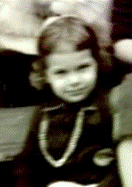truncate :
to shorten by or as if by cutting off
 When I was a child
growing up in New Orleans, I had a favorite hiding place. Cool and shady, even during the hottest, most
humid summer, no one could see me and I could let my imagination run wild. It was under the house.
When I was a child
growing up in New Orleans, I had a favorite hiding place. Cool and shady, even during the hottest, most
humid summer, no one could see me and I could let my imagination run wild. It was under the house.
There, I felt safe. My dad was an angry and abusive man.
He drank to oblivion most nights, which was really the best case scenario. On the nights when he drank one-too-few
beers, he could become very agitated and physically violent. I was usually the target of his ire.
My mom suffered from
schizophrenia. Hiding under the house
provided refuge from what was going on inside those four crazy walls.
I’d learned how
to “jump out” of my body at a very early age – around two-and-a-half years old. At
the time I didn't consciously know
what I was doing, but I know now that it was my way of keeping
my mind safe while my body was being injured. I was practicing “truncation”.
 Truncation might also be
called compartmentalizing, which is a widely used psychological analysis. We separate events, thoughts and feelings
from the core Self, usually as a way to avoid some type of pain.
Truncation might also be
called compartmentalizing, which is a widely used psychological analysis. We separate events, thoughts and feelings
from the core Self, usually as a way to avoid some type of pain.
Eventually, to become a
healthier person, I had to learn to integrate all the hiding places in my
world. That didn’t begin to happen until
adulthood. Actually, it’s still
happening.
Staying present has its
advantages. Compartmentalizing – not so
much. All of life is happening in this very
moment, as I write this. Nothing else
matters. I don’t want to miss a thing.
If you were traumatized
as a child – in any way – you likely truncate and don’t even know it. If you are accused of not paying attention,
of being listless, of not caring…a part of you is likely in hiding.
Integrating all parts of
Self is crucial. When I cut energetic
cords – the tethers that keep you bound to early childhood trauma – it’s like
stepping out into the daylight. You begin
your healing journey. You're on the way to becoming FREE and WHOLE.
It’s time to come out
from under the house.

